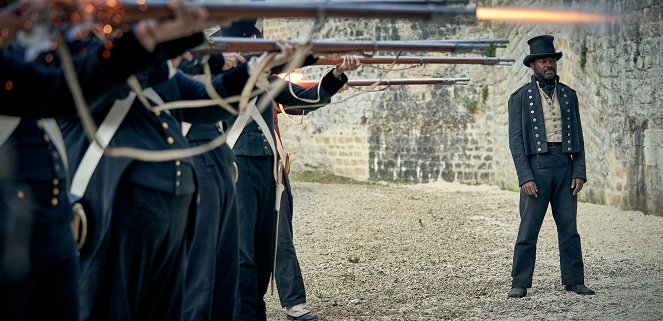Rendező:
Tom ShanklandForgatókönyvíró:
Andrew DaviesOperatőr:
Stephan PehrssonZeneszerző:
John MurphySzereplők:
Dominic West, David Oyelowo, Olivia Colman, Adeel Akhtar, Lily Collins, Ellie Bamber, Turlough Convery, Kathryn Hunter, Donald Sumpter, David Bradley (több)Epizódok(6)
Tartalmak(1)
1815-ben Franciaország a waterlooi csata után zűrzavaros időknek néz elébe. Jean Valjean 19 éves büntetése a végéhez közeledik a touloni kényszermunkatelepen, ahová egy darab kenyér ellopása miatt zárták. Javert, a fegyőrtiszt mély gyűlöletet érez minden bűnelkövetővel, de különösen Jean Valjeannal szemben, akit hamarosan szabadon kelll bocsájtania. Egy volt fegyenc nem sok jóra számíthat a világban, ám egy sorsfordító találkozás egy nagylelkű püspökkel, aki olyan bizalmat tanúsít Valjean iránt, amelyre önmaga sem tartja magát érdemesnek, egy új élet kezdetét jelenti számára. A kis Marius Pontmercyt királypárti nagyapja neveli, aki gyűlöli a kisfiú apját, Pontmercy bárót, amiért Napoleon seregében szolgált. A fiatal ezredest ugyan megmentette a waterlooi csatatéren – merő véletlenségből – egy arra járó fosztogató, Thénardier, ám felépülése után sem tud igazán talpra állni. Párizsban egy fiatal varrónő, Fantine táncolni megy barátnőivel, ekkor akad meg rajtuk a szeme egy jóképű úri társaságnak. A sármos Felix azonnal csapni kezdi a szelet Fantine-nak, aki enged a szerelem csábításának. (MTVA)
(több)Videók (1)
Recenziók (1)
The BBC's latest transcript of Les Mis is not bad. They approached the canonized substance with respect as usual, with a big budget, but also with the modern viewer in mind. With the older transcriptions, I often thought that many aspects of the novel needed to be commented on and explained after 150 years. I certainly don't mind Hugo's socially critical comments - on the contrary, I find them to be important. And they had a lot of good ideas at the BBC. The Thénardiers, for example, are very interesting here, simply because they are not a tight-knit group of bad guys, but they have problems with each other and they are personalities masterfully working with pretense. I really appreciated the entire story of Fantine with Félix Tholomyès before her departure to Montfermeil, because there is rarely any time left for that... It's not perfect of course, a lot of the questions I had with the older versions are answered here, but others are asked again that I would consider explained. However, it’s good to open up the classic debate on whether it is still appropriate to engage with the classic 19th-century novel today and what we can take from it for today (other than meeting some minimum in the context of a high school diploma or general overview, which in itself will never be sufficient for real adult life). The finale beautifully combines the action and the denouement of the individual fates, there is no lack of faith in a better tomorrow, but the reality that people like Thénardier continued their terrible lives in the colonies and the misery of course did not disappear from the streets even after the cry for freedom on the barricades in 1832... #bbc
()
Galéria (291)
Photo © British Broadcasting Corporation (BBC)


